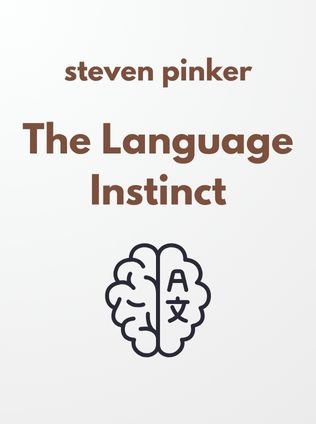
The Language Instinct
How the Mind Creates Language
By Steven Pinker
Published 01/1994
About the Author
Steven Pinker is a renowned experimental psychologist, cognitive scientist, and linguist who has made significant contributions to our understanding of the human mind. Specializing in areas like psycholinguistics, visual cognition, and social relations, Pinker has authored numerous books aimed at making complex scientific ideas accessible to the general public. His first major work, The Language Instinct, published in 1994, explores the idea that language is not just a cultural artifact but an innate biological ability unique to humans.
Pinker’s approach is heavily influenced by the groundbreaking research of Noam Chomsky, who first proposed the idea of an innate "universal grammar" hardwired into the human brain. In The Language Instinct, Pinker expands on this theory, using a mix of scientific evidence, linguistic analysis, and evolutionary biology to argue that language is a natural instinct, much like a spider's web-spinning or a bird's ability to fly.
Main Idea
The central premise of The Language Instinct is that language is an evolved, biological capacity inherent in humans. Pinker argues that this ability is not merely learned through cultural transmission but is a "superpower" that has evolved specifically in humans, akin to the chameleon's camouflage or the falcon's speed. He contends that language's complexity and versatility—its ability to generate infinite expressions from a finite set of rules—are proof of its biological roots.
Through this lens, Pinker challenges traditional views that regard language primarily as a cultural or learned skill. He suggests that humans are born with a predisposition for language, supported by a universal grammar that underlies all human languages. This innate capacity for language, he argues, is what allows children to learn languages quickly and even create entirely new languages in the absence of a pre-existing one.
Table of Contents
- Introduction to Language as an Instinct
- The Mechanics of Language
- Language as an Evolved Trait
- Universal Grammar and Its Implications
- Why Children Are Linguistic Geniuses
- Embracing Language Innovation
Introduction to Language as an Instinct
At the heart of Pinker’s argument is the idea that language is not something that humans merely learn through exposure or teaching, but rather an instinctual behavior that is hardwired into our brains. Pinker draws a parallel between language and other biological instincts, such as the web-spinning of spiders or the migratory patterns of birds. These behaviors, much like language, are complex and require sophisticated cognitive abilities, yet they are performed naturally without explicit teaching.
Pinker posits that language is a unique adaptation that has evolved to serve specific communicative needs within human societies. He describes language as an "infinite combinatorial system" where a finite number of sounds and symbols can be combined in infinite ways to produce a virtually limitless array of expressions. This system is governed by rules of syntax, which are part of the universal grammar that Pinker argues is innate to all humans.
Sign up for FREE and get access to 1,400+ books summaries.
You May Also Like
The Subtle Art of Not Giving a F*ck
A Counterintuitive Approach to Living a Good Life
By Mark MansonHow To Win Friends and Influence People
The All-Time Classic Manual Of People Skills
By Dale CarnegieFreakonomics
A Rogue Economist Explores the Hidden Side of Everything
By Steven D. Levitt and Stephen J. DubnerQuiet: The Power of Introverts
The Power of Introverts in a World That Can't Stop Talking
By Susan Cain



















